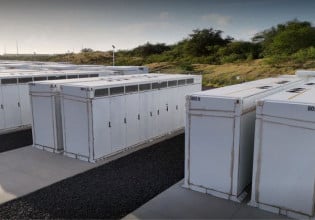Full-scale Production Begins on EV Auxiliary Pump Dual 40V MOSFET
Magnachip has started full-scale production of its new dual-package 40 V MOSFET targeted for electric water and oil pumps used in electric vehicles.
Magnachip has announced the beginning of mass production for its new dual-package, 40 V MXT MOSFET (AMDUA040N070RH), designed specifically to the requirements of electric water and oil pumps in electric vehicles (EVs).

Dual-package 40 V MXT MOSFET for EV auxiliary pumps. Image used courtesy of Magnachip
Compared with using two single 40 V MXT MOSFETs, the PDFN (Power Dual Flat No-lead) dual-package option will reduce circuit board space by 50%, integrating two FETs into the same package area.
The smaller form factor will offer designers more flexibility in their pump system designs and be suitable for power seat control applications.
MXT Silicon MOSFETs
Rated to a withstand voltage of 40 V, the MXT dual MOSFET offers a low on-resistance (RDSON) of 6.1 mΩ that minimizes conduction losses and facilitates thermal management in compact designs. Each FET can accommodate up to 35 A of continuous current, and the part is fully AEC-Q101 qualified for automotive applications.
With the dual-package configuration, a three-phase motor inverter circuit can be constructed using three dual PDFN56 packages (half-bridge configurations), as opposed to six single MOSFET packages that consume twice the PCB board space.
Magnachip’s larger portfolio of MXT MOSFETs supports withstand voltages ranging from 12 V to 200 V.

Dual PDFN56 package accommodates two 40 V MOSFETs. Image used courtesy of Magnachip
Electric Water Pumps in EVs
With no gas-powered internal combustion engine, EV operating temperatures are much lower than gas-powered vehicles with reduced system cooling requirements. Even so, liquid cooling systems and pumps are still required in EVs to ensure reliable performance.
ICE (internal combustion engine) vehicles typically have a single mechanical cooling pump and coolant system, while EVs often have two or more electric-powered pumps and separate cooling systems serving different heat loads. EV loads that can require cooling include the drive motor, traction inverter, battery, and onboard DC/DC conversion circuitry.
EV electric water pumps are not exposed to very high temperatures. Since the smaller electric pumps are not physically connected to the rotating drivetrain, they can be placed anywhere within the vehicle that is convenient.
Some EVs can use air cooling systems in place of water, but air systems are less efficient and not as consistent at removing heat across all environmental conditions, so they can limit the vehicle's performance.
Power for the electric cooling pumps comes from the EVs electric bus and is delivered to the pump motors through inverter drive circuits formed from power FETs like the 40 V MXT MOSFET.

EVs typically have two or more water pumps for system cooling. Image used courtesy of GMB
EVs a Growing Market for Silicon MOSFETs
While the latest high voltage, wide bandgap power FET solutions like silicon carbide (SiC) and Gallium Nitride (GaN), used in EV OBCs, charging infrastructure, and traction inverters, typically get most of the press, the opportunity for traditional silicon-based MOSFET solutions remains robust.
According to research group Omida, the silicon MOSFET market for hybrid and EVs is projected to experience double-digit growth over the next several years, with a projected CAGR of 11% from 2023 to 2026.
EV electric pumps are a good example of the expanding market opportunity. Where traditional ICEs use a single mechanical water pump for cooling, EVs use two or more electric pumps for their cooling systems, each requiring its motor drive circuit composed of silicon MOSFETs.
Silicon also has advantages over the more exotic SiC and GaN technologies in high-voltage powertrain and charging applications. For applications that don’t need high voltage or temperature performance, traditional silicon FETs can be very cost-effective, a particularly important attribute in price-sensitive automotive markets.

Silicon MOSFET market for EVs to grow at 11% per year. Image used courtesy of Magnachip






